
Freshfel Europe Headlines – Edition 3, 2023
Freshfel Europe’s Headlines publication provides an overview of the Association’s most recent activities.
For more information about Freshfel Europe’s activities please contact the Freshfel Europe Secretariat.

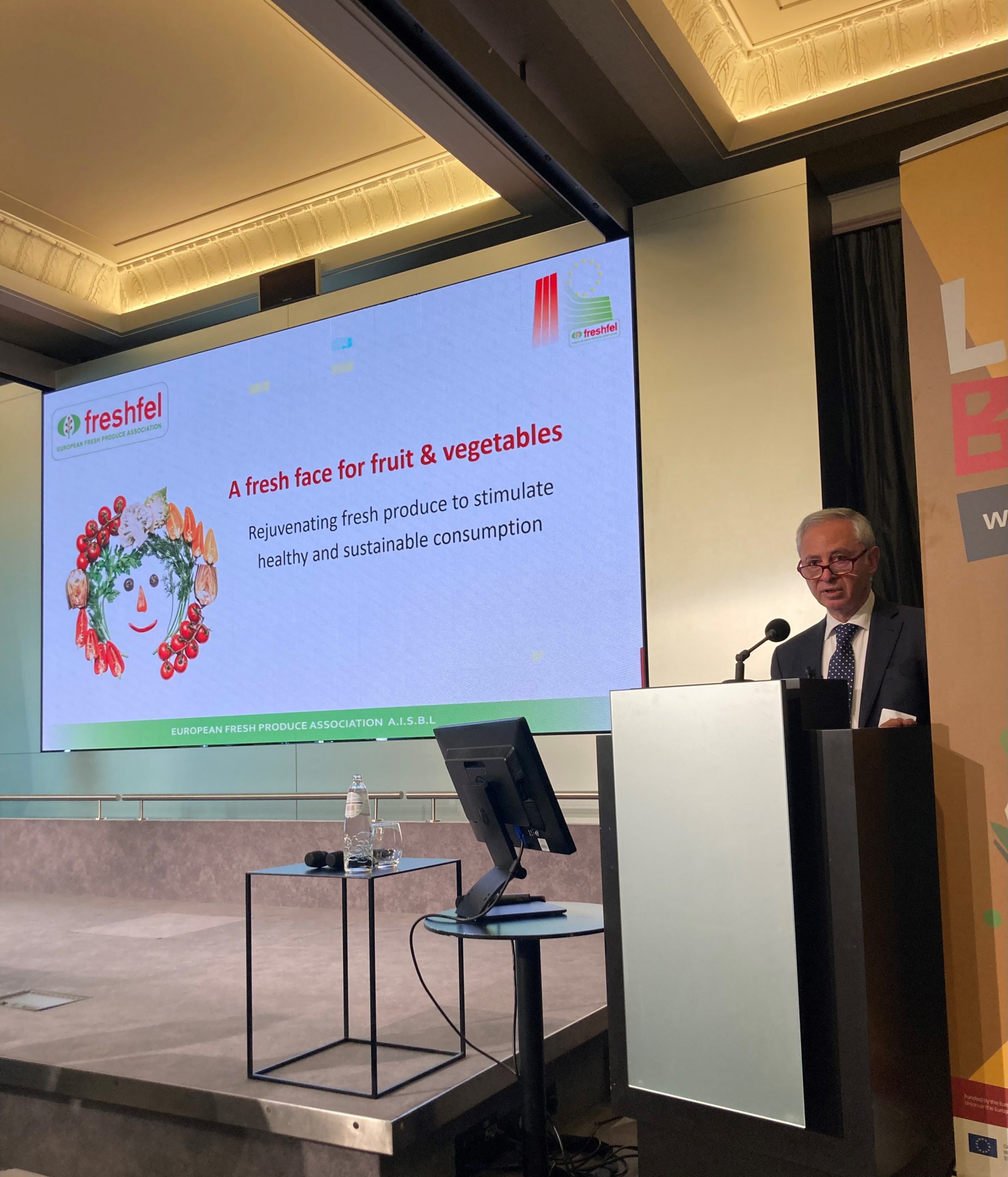
Building a new face for fresh produce includes demystifying misperceptions about the prices of fresh produce
On the occasion of the Freshfel Europe Annual Event, Salvo Laudani, President of Freshfel Europe called on the sector to join forces in reinforcing the role of the sector as essential and address the misperception on health, prices, and environmental and safety aspects around fresh produce. Fresh produce is one of the most affordable food categories, and its limited impact on inflation and the purchasing power of consumers is not often depicted by the media. Just a few years ago, during the pandemic, fresh fruits and vegetables were the heroes. Consumers knew that fresh produce is a sustainable food alternative with high health benefits and low environmental impacts. Now, fruits and vegetables are more and more often being portrayed negatively, with misleading and untrue information on water use, quality and safety and affordability being disseminated in communication outlets.
One of the most common current misconceptions is that fruits and vegetables have become unaffordable, with prices driven up by the high inflation rates of the last year. Estimations in Italy based on Istat data and Nielsen analysis show that in 2022, monthly household expenditure increased by €446, out of which grocery expenditure accounted for €35 with 10% being attributed to fruits and vegetables. That means that the inflation on fruits and vegetables only led to an increased cost of €3,5 more per month, or 0,1 cents per day, for Italian households.
Through the use of data and market intelligence tools, Freshfel Europe will continue to address misconceptions regarding fruits and vegetables.

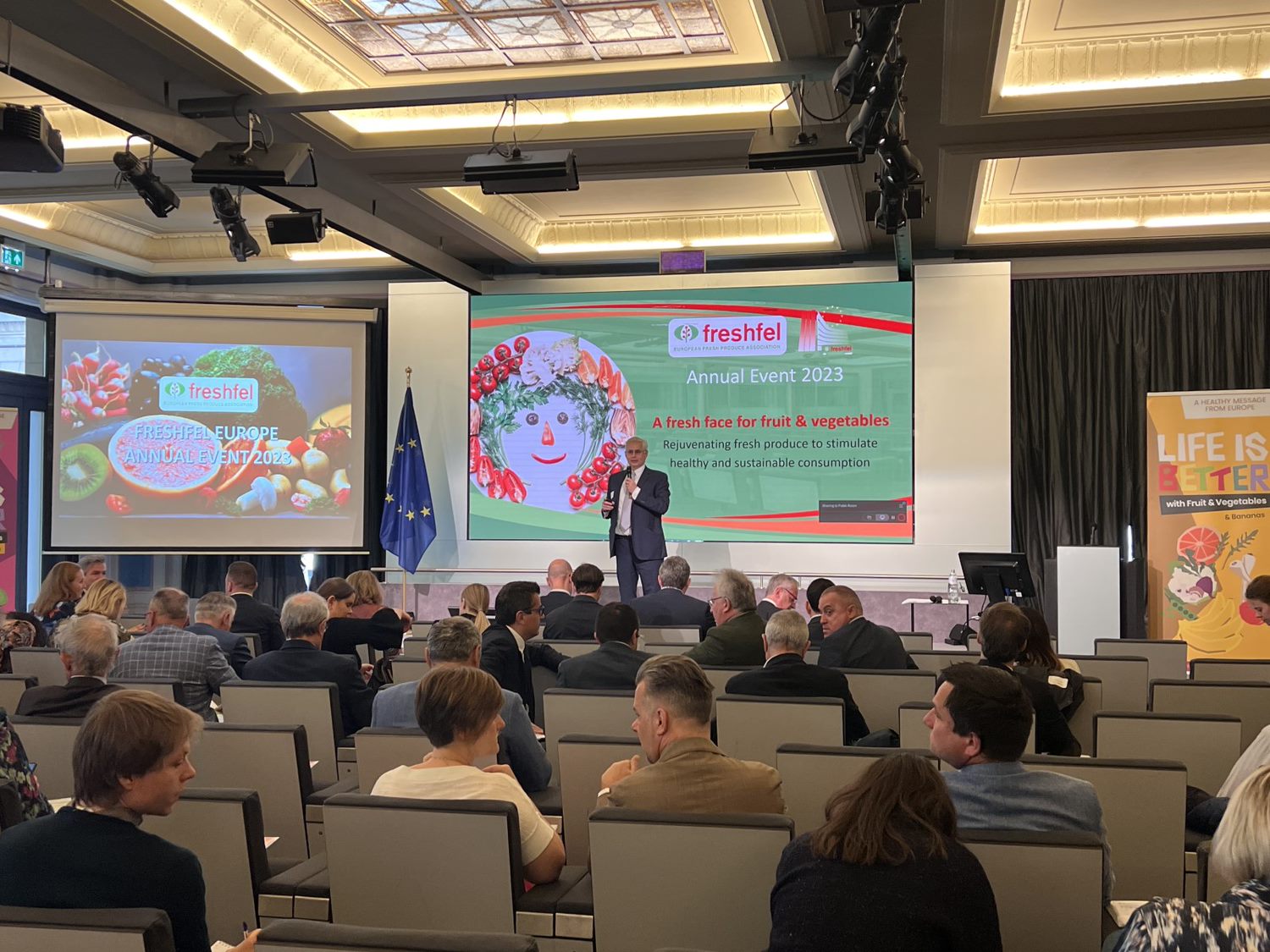
Freshfel Europe’s Annual Event focuses on unravelling misconceptions and proclaiming the true, fresh face of fruits and vegetables while needing to move in the climate change debate
On 25 May Freshfel Europe held its Annual Event 2023 in Brussels. The Annual Event focused on building a fresh image for fresh fruit and vegetables, around the theme ‘A fresh face for fruit & vegetables’. Rejuvenating fresh produce to stimulate healthy & sustainable consumption was at the centre of discussion while the sector remains confronted with several challenges relating to rising costs, structural challenges due to climate change, misleading negative public depictions of products, and a steadily decreasing consumption rate. The price misperception and wrongful depiction of the affordability of fruits and vegetables is a point of special concern.
This year’s annual event focused on how the sector will position itself at the forefront of sustainable change, promoting accountability and responsibility to accurately showcase the many assets and benefits of fresh fruits and vegetables, portraying a ‘fresh face’ and the true qualities of the products. At the event, Freshfel Europe’s latest activity report was released. The Freshfel Europe 2023 Activity Report is available online here.

European Commission’s initiative on mandatory origin labeling for IV gamma products: Freshfel Europe warns the European Commission on far-reaching implications
Since late 2022 Freshfel Europe and its members have been following discussions regarding the amendments to the marketing standard regulation of fresh fruit and vegetables. The European Commission is aiming to introduce a number of changes that would have a significant impact on fresh produce, especially on IV gamma products due to mandatory origin labelling.
The draft Regulation on marketing standards is meant to align with the objectives of the Farm to Fork Strategy, namely the provisions relating to increased information for consumers and reduction of food waste. While the European Commission’s intentions correspond to the objectives of the Farm to Fork Strategy, the proposed draft text is expected to lead to a significant price increase of pre-cut fruit and vegetables marketed as IV gamma products. Freshfel Europe believes that the new rules will reduce fresh produce’s attractiveness to consumers, breaching the ambition of the Farm to Fork Strategy to move to a more plant-based diet. Freshfel Europe is also conclusive that the Commission’s proposal will increase plastic packaging waste and generate more food waste.
If adopted at the end of June, the proposal of the Commission will not allow the IV gamma industry to process ‘ugly’ fruit and vegetables or oversized products. While the Commission intends to reduce food waste by allowing ‘ugly’ fruit and vegetables to be sold locally and directly by producers to consumers, the share of these fruits and vegetables is negligible compared to the volumes used by the IV gamma industry and sold as kitchen-ready or ready-to-eat to consumers. If adopted, the rules will unfairly discriminate operators involved in the preparation of IV gamma products against the manufacturers of frozen or canned fruit and vegetables. Manufacturers of processed foods will still be allowed to source ‘ugly’ fruit and vegetables. As such, the IV gamma industry will no longer be able to contribute to reducing food waste. Moreover, there are products, such as lettuce, that cannot be processed other than by cutting and will therefore be wasted.
Freshfel Europe noticed huge inconsistencies in the text with regard to origin labelling of IV gamma products. The same rules on origin labelling do not apply to all food categories. Different labelling rules are proposed for products presented in mixes or as single ingredient. Moreover, rules will differ for products composed of raw materials that fall under specific or general marketing standards. This will heavily restrict the daily operations of business operators involved in the production of IV gamma products. It will impose barriers to sourcing raw materials because packaging materials that include origin indications must be pre-printed in advance. This will be reflected in the final price for the European consumer putting further pressure on consumption of fresh fruit and vegetables. Consumption today is already below the recommended norm of 400 g/day. The new rules will impact the already low consumption. Consumers choose IV gamma products because of their convenience in combination with price.
The industry urges the European Commission to amend its proposal and compromise for the benefit of consumers’ health across the EU, reduction of food waste and protection of the environment. This can be achieved by providing a legal framework which would allow the industry to use ‘ugly’ fruit and vegetables and oversized products as ingredients of IV gamma products. In addition, the compromise has to include the legal framework that would allow the origin indication as ‘EU, ‘non-EU’, ‘EU & non-EU’ for all products in all compositions falling under the definition IV gamma products.
Freshfel Europe also urges the Commission services to propose policy initiatives which are justified and meet the objectives of the Farm-to-Fork Strategy based on factual evidence of whether these policy initiatives will not result in devastating consequences in other areas proposed under the same strategy. Commission-wide governance is needed to address the objectives set under the Farm to Fork Strategy.

Freshfel Europe and the continued work on packaging and single-use plastics
Freshfel Europe continues its advocacy for finding sound regulatory solutions for sustainable packaging of fresh fruits and vegetables in Europe. The Association is doing this partly through engagements with Member State’s implementation of the EU Single-Use Plastics Directive, where recently Freshfel Europe and its members communicated on the Luxembourgish transposition of the EU directive. The Association continues to emphasise the disruptions and barriers to both intra and extra-EU trade diverging Member State legislations would bring, and advises against a patchwork of national legislations on the EU single market.
Freshfel Europe is also actively taking part in the discussions on the proposal for an EU Regulation on packaging and packaging waste. While welcoming the proposal for a regulation which would ensure harmonized measures across the EU, the proposal puts forward disproportionate, unfounded, and discriminatory provisions for the fresh produce sector. Apart from continuously communicating on the added value packaging brings to the quality and safety of fresh fruits and vegetables, the Association also warns against the many risks a ban on the packaging of fresh produce would pose to food waste levels, food security and competitiveness. Any restriction in the packaging of fresh fruits and vegetables must be based on full impact assessments and in close cooperation with sector experts who possess the operational expertise.
By engaging with Members of Parliament, the European Commission, the European Council, and other Associations and organisations, Freshfel Europe raises awareness of and advocates for the necessity of packaging for fresh fruits and vegetables. In the weeks ahead, Freshfel Europe will be participating in a panel discussion at the European Parliament and meet with governmental representatives of the Swedish Ministry of Rural Affairs and Infrastructure and the Swedish Food Agency.
.

Freshfel Europe highlights the importance of reviewing market access priorities for the sector
Freshfel Europe produced, in the context of the ongoing FTA negotiations with Indonesia and the upcoming ones with Thailand, two position papers shared with policymakers to highlight the obstacles the sector faces in trading with those countries. This includes especially PRA-related difficulties and calling on the authorities to take the opportunity of the negotiations to tackle them and guarantee a more even and freer global trade of fresh produce.
In its position papers, Freshfel Europe advocated for common phytosanitary standards based on the IPPC work and a more transparent and delineated process for the conduction and approval of PRAs to make the life of producers and exporters easier and to support the diversification of outlets for export of produce. Freshfel Europe also produced an additional paper, in response to a call from the European Commission’s DG Trade, on the EU’s market access priorities list which is undergoing an update. In the paper, Freshfel Europe highlighted missing markets and issues that were not included but remain of concern for EU producers.
The high interest that the paper received prompted a joint meeting in May with the Commission’s DGs AGRI, SANTE and Trade so that Freshfel can help the Commission identify (and later address) the market access obstacles and issues the sector faces in third countries for the fresh fruit and vegetables sector, particularly concerning PRAs and other issues. In the meeting, it became apparent that some of the issues raised by Freshfel Europe were unknown to the authorities. To address this knowledge gap, Freshfel Europe and the Commission are working on updating the database on the status of ongoing pest risk analyses for priority countries to remedy the amount of out-of-date information, as well as to map out the existing network of functioning protocols.
Through this work, Freshfel Europe can help provide a clearer perspective on the issues facing the sector and diversify trade and consumption, helping to build up the sector’s resilience and reinforcing trade links with third countries.

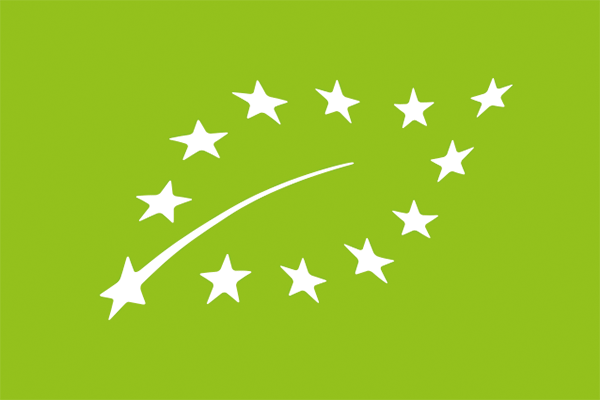
Freshfel Europe holds webinar discussing the organic market and organic trade
In April, Freshfel Europe held a webinar for its members discussing the current situation, and outlook of the organic market in Europe, as well as on organic trade with third countries. The meeting consisted of a market overview conducted by the Freshfel Europe secretariat and featured three speakers from the European Commission’s Unit on Organics.
The meeting showed that although the organic market is developing, there are still some obstacles to address, mainly related to compliance, cost efficiency, better balance of demand and supply, and regaining consumer interest which has declined due to decreased purchasing powers and a broadening of expectations and search for qualities beyond organics.
Further efforts must be undertaken to ensure that demand catches up with supply, as we today see a discrepancy where the organic volumes are increasing but consumer interest is decreasing. There is currently a lack of attractiveness to convert into organic production of fresh produce. To encourage organic farming there must be increased efforts in advertising and promoting organic products and practices, innovation, and better adherence and flexibility to the concerns and needs of growers who are considering converting, in conversion or already certified. Choosing to convert to organic production should not come at unproportionate extra costs, labour, administrative burdens or risks of not receiving proper compensation for the grower’s input, but rather be encouraged in order to reach the goal of the Green Deal and the EU Organic Action Plan

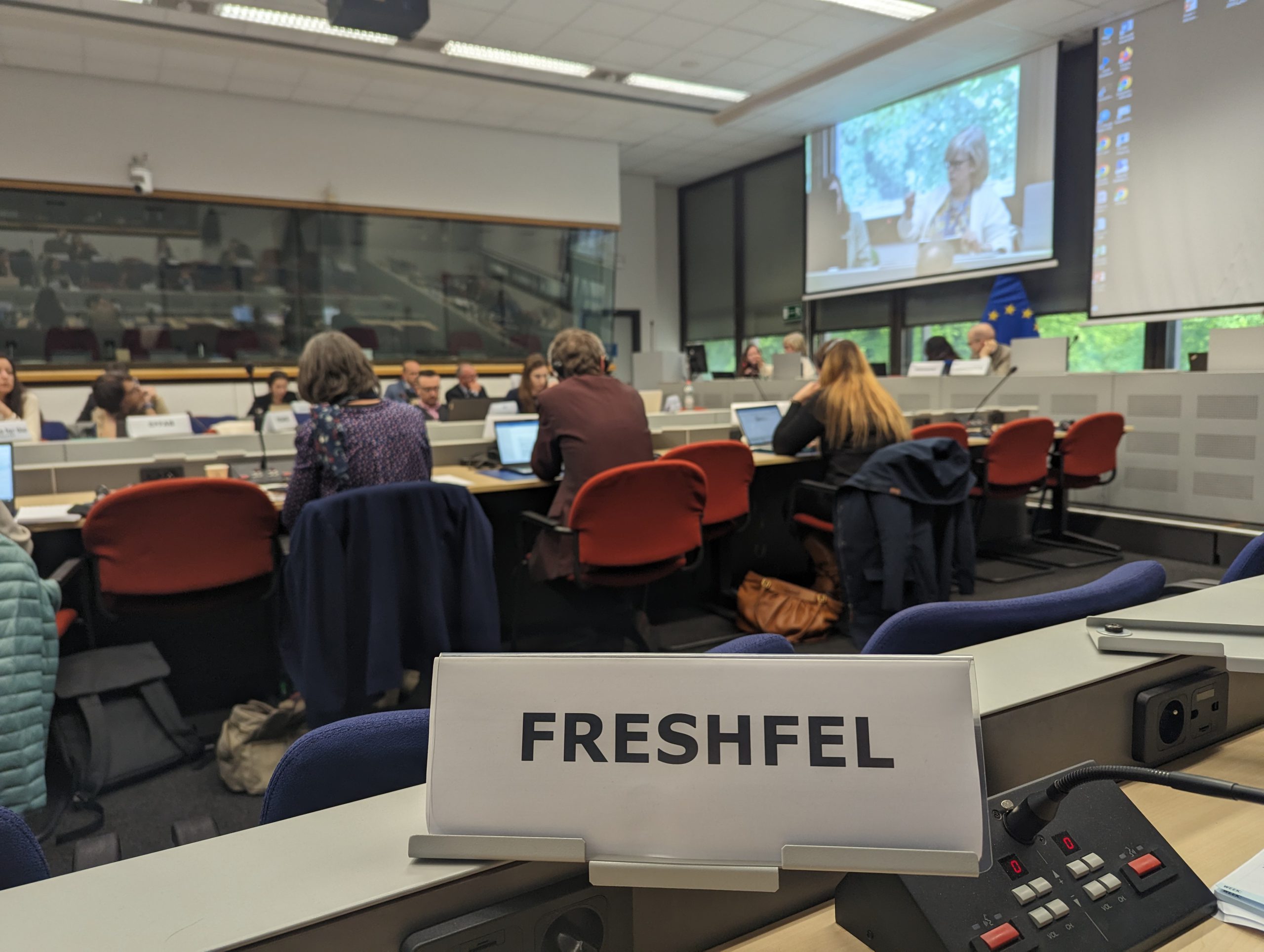
Freshfel Europe attends first DG SANTE plenary on Sustainable Food Systems
On 12 May Freshfel Europe attended the Plenary Meeting of the Advisory Group on Sustainability of Food Systems of DG SANTE. The bi-annual meeting of the Advisory Group reviews the topics of common concern for its members who are the representatives of different industry organisations and NGOs. At the meeting different matters have been reviewed, including updates on the framework for sustainable food systems; plants obtained by certain NGTs; plant health and plant reproductive materials; substantiation and communication of explicit environmental claims; international outreach activities on Farm to Fork SFS Chapter and official Controls Regulation guidance.

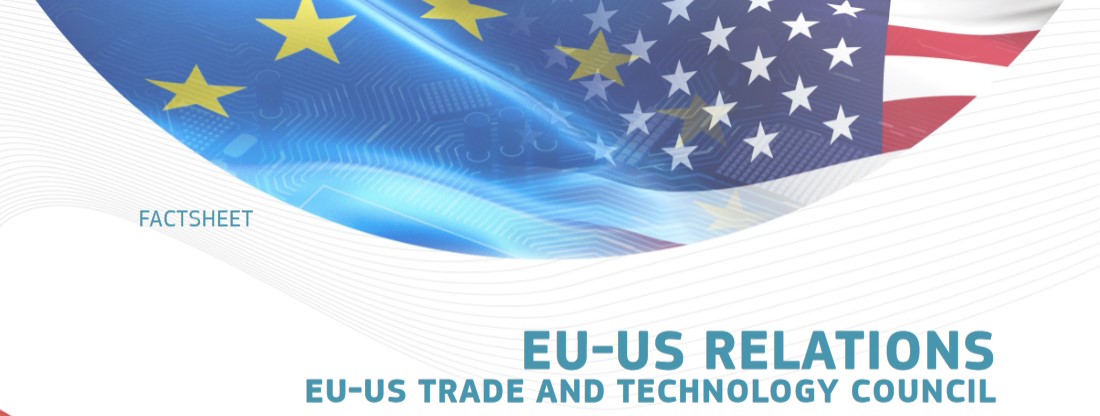
Freshfel takes part in the discussion of the EU-US Trade and Technology Council on the role of digitalisation to boost trade
Under the leadership of DG TRADE and USTR, Freshfel Europe took part in a stakeholder discussion on the role of digitalisation to boost transatlantic trade. Freshfel Europe reminded that the main trade hurdles are those relating to SPS matters imposed by the USA on market access, while US exporter experience difficulties coping with EU customers’ requirements. Therefore, addressing matters on digitalisation does not only matter for transatlantic trade but for global fruit and vegetable trade. Avoiding the proliferation of systems and unharmonised tools that would lead to added costs and confusion is essential. The COVID pandemic contributed to enhancing digitalisation, but more still needs to be done for full efficiency.
Despite limited transatlantic trade, the expertise of both blocks can take a leadership role in the shift towards further digitalisation of fresh produce trade. Having tools in place that allow a speedy and secure movement of goods and information between operators, and for the administration of customs and controls, is key considering the perishable nature of fruit and vegetables. Freshfel Europe’s General Delegate Philippe Binard also highlighted the need for interconnecting hubs such as TRACES and IPPC’s E-Phyto scheme to boost digitalisation. This would have positive effects by decreasing administrative burdens, preventing documentation mistakes and reducing costs. It could also prevent fraud and allow faster response to problems. Accessibility of aggregate data would enhance food safety and biosecurity through greater transparency, helping the sector to remedy non-compliance.

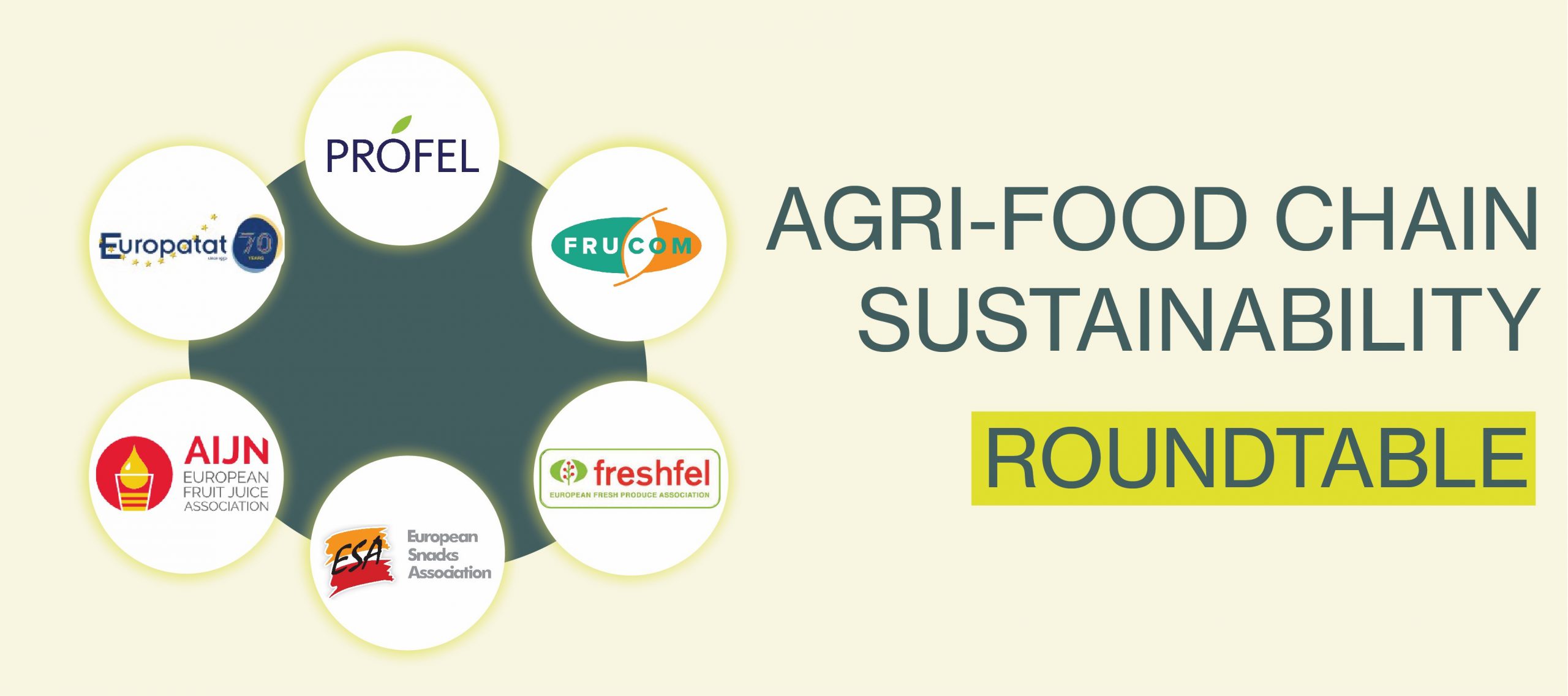
The Agrifood Chain Sustainability Roundtable discusses sustainability labelling in retail
On Tuesday 18 April, the Agrifood Chain Sustainability Roundtable (The Sustainability Roundtable), of which Freshfel Europe is part, hosted a webinar on sustainability labelling in retail. The webinar served as an opportunity to discuss different views on if, how and why retailers choose or do not choose to use sustainability labels. The panel consisted of speakers from Coop Trading Denmark, REWE and Eroski and was attended by more than 120 participants.
The Sustainability Roundtable is an informal gathering of European agri-food chain industry associations established in March 2022 to exchange information, views, concerns, and positions, on preparatory legal acts and the implementation of legislation pertaining to sustainability. The members of the roundtable represent a broad spectrum of the European agri-food sector, and the roundtable is a valuable forum to learn from one another’s experiences. Members of the Agri-food Chain Sustainability Roundtable are AIJN (European Fruit Juice Association), ESA (European Snacks Association), Europatat (European Potato Trader’s Association), Freshfel Europe (European Fresh Produce Association), FRUCOM (Dried Fruits, Nuts, processed Fruit and Vegetables & processed Seafood), PROFEL (European Association of Fruit & Vegetable Processors) and FEFAC (Feed Manufacturers Federation).
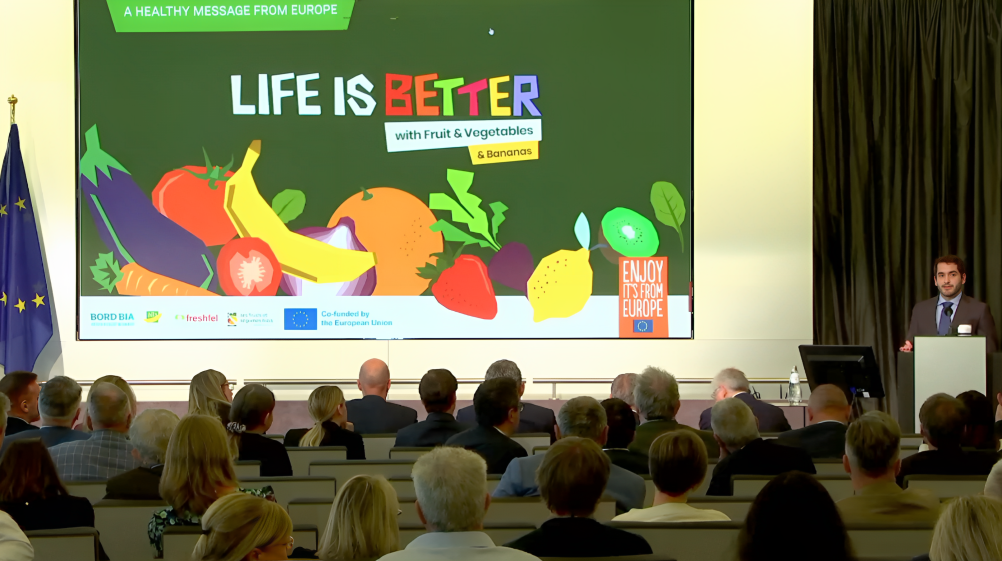
Life is Better with Fruit and Vegetables – Second Annual Event
The second Annual Event of the Life is Better with Fruit and Vegetables campaign took place on 25 May 2023, as part of Freshfel Europe´s Annual General Meeting.
The highlights from Year 1 of the campaign were presented to about 100 Freshfel Europe members, and Paris was announced as the host city for the 2024 event. Later in the day, a cooking workshop with Millennial influencers and young workers took place, where professional chefs showed the participants how they can easily incorporate fruit and vegetables into their diets.
Life is Better with Fruit and Vegetables is an EU-funded programme that targets Millennials and aims at increasing their level of knowledge regarding the nutritional benefits, versatility, sustainability, and practicality of fruit and vegetables. Young Europeans aged 25 to 35 represent a key demographic of consumers, as they are still shaping their purchasing and eating habits.
The campaign, which was officially launched during a press conference on the occasion of Freshfel Europe´s Annual General Meeting on 18 May 2022, will run until February 2025 and will take place in France and Ireland, in addition to having a pan-European dimension. It involves Interfel, AIB, Bord Bia, and Freshfel Europe.
All the material of the project is available on the website of Life is Better with Fruit and Vegetables, with a dedicated webpage for each of the target countries of the campaign (France and Ireland, in addition to Germany, Italy, Poland, and Spain).
